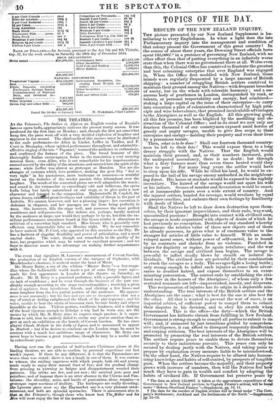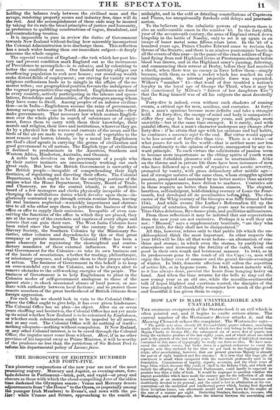RESULTS OF THE NEW ZR A T AND INQUIRY.
THE picture presented by our New Zealand Supplement is humiliating to every Englishman. In what a light does the late Parliamentary inquiry into the management and condition of that colony present the Government of thisgreat country ! In the course of about three years, the Downing Street officials have spent 135,000/.* in a pretence of governing New Zealand, with no other effect than that of putting everything in an infinitely worse state than when there was no government there at all. Worse even than this, the Colonial Office has contrived to frustrate the greatest and best colonizing enterprise that ever England was engaged in. When the Office first meddled with New Zealand, those islands were regularly frequented by a large amount of British shipping : a number of straggling British settlers contrived to maintain their ground among the Natives—with frequent breaches of amity' but on the whole with tolerable harmony ; and a numerous body of gentlemen in London, distinguished by rank, or talents, or personal respectability and energy, had combined— staking a large capital on the issue of their enterprise—to carry into execution a plan of colonization characterized by high principle and wise benevolence, that promised incalculable advantages to the Aborigines as well as the English. All this growing good, all this fair promise, has been blighted by the medng and obstruction of the Colonial Office ; and in its stead we now only see fourteen thousand t of our countrymen exposed amid hordes of greedy and angry savages unable to give free scope to their enterprise and energy—holding their property and even their lives
by a precarious tenure.
Then, what is to be done? Shall our fourteen thousand countr3r men be left to their fate ? This would expose them to a long' dreary strugFle with the Natives. That the English would maintain their ground, and, as their numbers increased, gain the undisputed ascendancy, there is no doubt : but through what a fiery furnace more than seven times heated would they have to pass ? For many long years the settler would have to sleep upon his rifle. While he tilled his land, he would be exposed to the ball of his savage enemy ambushed in the neighbouring forest. His house or stockade would be exposed to the nightly incendiary. The hatred of the savage would not spare his wife or his infants. Scenes of murder and devastation would be enacted at innumerable points over a wide extent of country. And the injured settlers, banded for revenge, would retaliate by equal or greater cruelties and embrute their own feelings by familiarity with deeds of blood.
Shall the Natives be left to draw down destruction upon themselves by their ignorant improvidence, and their rude wayward, uncontrolled passions ? Brought into contact with civilized men, the savage is made acquainted with objects of desire of which he had previously no conception. Destitute of any standard whereby to estimate the relative value of these new objects and of those he already possesses, he ..ives what is of enormous value to the stranger for articles of little value to himself. With an undeveloped moral sense without power of self-control, he is bound by no contracts and shrinks from no violence. Punished in anger for duplicity or rapine, he again retaliates and the war between the savage and civilized man begins. The savage is powerful to inflict deadly blows by stealth on isolated individuals. The civilized men are powerful by their combination to crush the savages as a body. The savages fight a losing battle, ; only strong enough to inflict such injuries as rouse their adversaries to deadlier hatred, and expose themselves to an exterminating persecution. The contest ends by establishing the civilized race in the haunts of the Aborigines ; of whom only a few scattered remnants are left—impoverished, moody, and desperate. This reciprocation of injuries has its origin in a deplorable misunderstanding. The true interests of the British settlers and the Aborigines are the same : what is best for the one is also best for the other. All that is wanted to prevent the war of races, is an impartial arbiter, of sufficient power to compel them to submit their disputes to his decision, and to obey his awards when pronounced. This is the office—the duty—which the British Government has hitherto shrunk from fulfilling in New Zealand. Government is strong enough to compel all parties to submit to its will ; and, if animated by just intentions guided by comprehensive intelligence, it can afford to disregard temporary disaffection and carping criticism. The best interests of the Aborigines will be promoted by promoting the real interests of the British settlers. The settlers require peace to enable them to devote themselves securely to their industrious pursuits. This peace can only be secured by dealing justly with the Natives, and taking pains to prepare by explanation every measure liable to be misunderstood. On the other hand, the Natives require to be allured into humanizing knowledge and habits of self-control, by prospects of tangible gain. When the settlers become the majority, and their property grows with increase of numbers, then will the Natives feel how much they have to gain in wealth and comfort by adopting the habits of civilized life. If Government but preserve peace by • The data on which 135,000/ is taken as the approximate expenditure of the Govenunent in New Zealand previous to Captain Fitzroy's arrival, will be foul under " Hobson-Shortland Finance "—Supplement, pp, 10, 11. The data for the number of English settlers will be found under "The Company'a Settlements; Anekluid and the Settlements of the North"—Suppleuzenty pp. 11-13. holding the balance truly between the civilized man and the savage, rendering property secure and industry free, time will do the rest. And the accomplishment of these ends may be insured by taking for its rule the broad principles of justice and humanity, in preference to quibbling constructions of vague, fraudulent, and
-contradicting treaties. . It is impossible to pass in review the duties of Government towards New Zealand without feeling how miserably incompetent the Colonial Administration is to discharge them. This reflection has a much wider bearing than our immediate subject—it deeply concerns the whole empire.
The especial vocation of England—the task which her past history and present condition mark England out as the instrument of Providence to accomplish—is to colonize, and by colonizing to better the condition of men. Our limited territory obliges our overflowing population to seek new homes ; our stored-up wealth seeks distant fields of employment ; our craving for variety or our religious enthusiasm leads us to mingle in the affairs of the remotest tribes ; our geographical position favours the indulgence of the vagrant propensities thus engendered. Englishmen are found in every country, actively participating in the labours and speculations friendships and ammosities, of the strangers among whom they have come to dwell. Among peoples of an inferior civilization—as in India—Englishmen assume the reins of government. Among savage tribes—as in North America and Australia—they Make governments. That necessary law which scatters Englishmen over the whole globe in search of subsistence or of enjoyment, forces them to carry with them their knowledge, their morals and religion, their laws and institutions wherever they go. As by a physical law the waves and currents Of the ocean and the birds of the air are made to carry the seeds of vegetables to the most remote and barren islands, so by a moral law Englishmen are God's chief agents in carrying the germs of civilization and good government to all nations. The Fmglish type of civilization is destined to predominate in the Americas, Southern and Western Africa, Hindostan, Australia, and Oceania. A noble task devolves on the government of a people who by their native instincts are unconsciously working out such great ends. But here the British Government is unworthy of the British people—incapable of comprehending their high destinies, of regulating and directing their efforts. The Colonial Department, which ought to be for the outlying portions of the empire what the Home Department, Treasury, Board of Trade, and Chancery, are for the central islands, is an inefficient board of a few managers and clerks physically incapable of discharging the multifarious duties which devolve upon them—ingloriously contented to go through certain routine forms, leaving all real business neglected—waspishly impertinent and obstructive to all who either urge them to perform the business of their dffice or offer to supply their omissions. Incapable of even conceiving the functions of the office in which they are placed, they sre at the mercy of the crotchets and caprices of every clique and coterie that can gain their ears. The West India Colonies have been ruled since the beginning of the century by the AntiSlavery Society, the Southern Colonies by the Missionary Societies, other colonies and dependencies by this or that great company or private interest. The Colonial Office has been a mere chancery for registering the shortsighted and contradictory mandates of these external influences. We want a real Government for the Colonies—to take its own business out of the hands of associations, whether for trading, philanthropic, or missionary purposes, and relegate them to their proper spheres of action. The business of Government in this behalf is to keep an ever-watchful eye on the Colonies, and to be always alert to remove obstacles to the self-working energies of the people. The business of Government is to help Englishmen to plant in the Colonies modes of self-government analogous to those of the Ert state es ; to check occasional abuses of local power, or mee with authority between local factions ; and to protect those remote members of the great brotherhood of British citizens from foreign aggression. 'For such help we should look in vain to the Colonial Office : where the Office ought to give help, it has ever given hinderance. The Colonial Office has no plan—no object. After six or seven years shuffling and hesitation, the Colonial Office has not yet made up its mind whether New Zealand is to be colonized by Englishmen, or whether such colonization ought to be impeded by all means, and at any cost. The Colonial Office will do nothing of itself—. nothing adequate—nothing without compulsion. If New Zealand, or any other Colonial interest, is to be saved through the Colonial Office, the impulse must come from without. Here, if in no other province of his imperial sway as Prime Minister, it will be worthy of the prudence no less than the patriotism of Sir Robert Peel to reform his departmental policy of Laissezfaire.























































 Previous page
Previous page